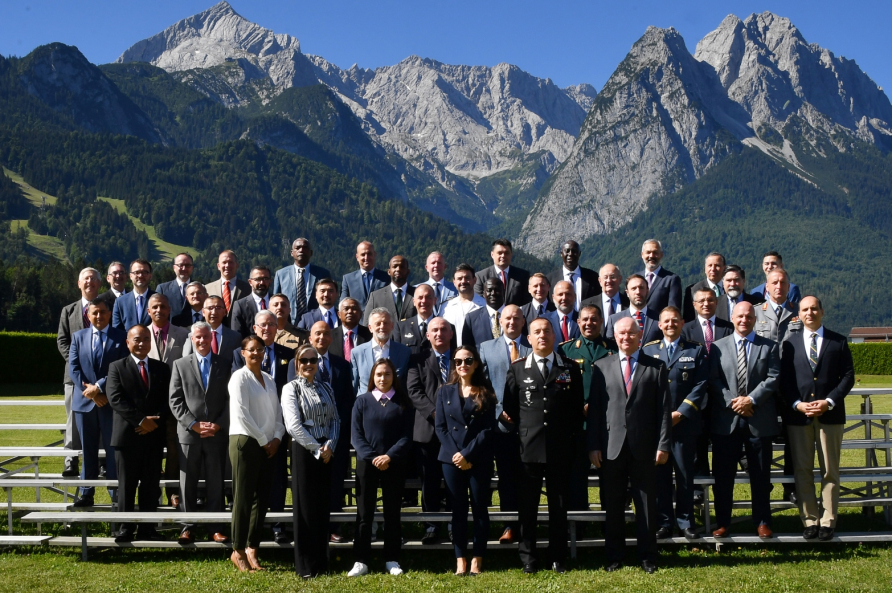Marshall Center Hosts Senior Executive Seminar on Transatlantic Security Cooperation
By Fritz Rademacher
College of International and Security Studies
George C. Marshall European Center for Security Studies
Following the series of international summits, including the G7 meeting in Elmau and the NATO Summit in Madrid, the Marshall Center hosted its 2022 Senior Executive Seminar on “Transatlantic Security Cooperation – Facing the Challenges Together”, 11-15 July. 40 high-ranking civilian and military officials at the level of junior ministers, ambassadors and flag officers from 30 allied and partner countries engaged actively in the strategic dialogue.
Participants received the welcoming message from the NATO Deputy Secretary General, H.E. Mircea Geoanǎ. Distinguished speakers and panelists included the Chair of the NATO Military Committee, Admiral Rob Bauer from the Netherlands; the Chief of the Polish General Staff, General Rajmund T. Andrzejczak; the Commanding General U.S. Army Europe and Africa, General Darryl A. Williams; the former Foreign Minister of Tunisia and Founding President of the Tunisian Council on International Affairs, H.E. Khemaies Jhinaoui; Ambassador Marc Pierini from Carnegie Europe; the Deputy Chief of the Italian Defense Staff, Lt. Gen. Carmine Masiello; the former NATO Assistant Secretary General for Defence Policy and Planning, Lt. Gen. (ret.) Heinrich Brauss; Professor Emeritus Sir Lawrence Freedman from King’s College; the DoD Principal Director for Europe and NATO Policy, Mr. Andrew L. Winternitz; Dr. Daniel Hamilton, SAIS Senior Fellow; and the Special Envoy to the Director-General for Security and Defense Policy in the German Ministry of Defense, Dr. Karl-Heinz Kamp.
During the five-day program, participants assessed in detail the key strategic issues of transatlantic interest in view of the new NATO Strategic Concept, the European Union’s Strategic Compass, and the United States’ National Security Strategy. Participants addressed the challenges surrounding deterrence and defense, with a focus on the eastern flank and on questions of burden and responsibility sharing. Participants looked at ways to strengthen the resilience of our societies for an era of disruption. They also explored how to promote a more secure and stable south.
While the event discussions had understandably a strong focus on Russia’s war of aggression against Ukraine and its consequences for Euro-Atlantic and international security and stability, speakers and participants alike stressed the need for a comprehensive and holistic strategic appreciation of the complex interconnected and concurrent challenges that characterize the new security environment. Those include, amongst others, systemic competitors, such as China, attempting to undermine our open societies and liberal democracies, the widespread instability in the Euro-Atlantic neighborhood, the enduring threat of terrorism, nefarious non-state actors, proliferation of weapons of mass destruction, emerging and disruptive technologies, disinformation, and climate change.
In their discussions, participants inter alia underscored the overriding need to avoid Ukraine’s total defeat and to continue to provide the means of defense against Russian aggression, recognizing the destabilizing effects of Russia’s actions on Euro-Atlantic security and the rules-based international order, while offering potential avenues for countering them, including outside the Euro-Atlantic area. On deterrence and defense, they highlighted the specific challenges the transition to a posture based on deterrence by denial would pose for the Alliance in the pursuit of its 360-degree approach concept. Participants promoted the idea of fostering global partnerships with like-minded countries particularly in the Indo-Pacific region in order to contest China’s regional rise and global ambition to rewrite the international rule book. The Seminar acknowledged that Euro-Atlantic and transatlantic security was tied to the stability of the southern hemisphere. In particular, the partnerships with the African Union, other regional actors and individual MENA countries had to be prioritized and improved; humanitarian efforts in unstable regions be supported; and capacities be developed and local resilience be encouraged. To this end, participants saw great potential if NATO and the EU could truly operationalize their coordination and cooperation in pursuit of the aforementioned objectives.
The 2022 Senior Executive Seminar is part of a three-year cycle which the Marshall Center is organizing for alumni and newcomers alike. The cycle is focusing on the overarching theme of transatlantic security cooperation in an era of global challenges and strategic competition. Next year’s Senior Executive Seminar to be held in Garmisch-Partenkirchen in the month of June will offer the participants the opportunity to formulate strategic-level recommendations as to how to deepen existing and forge new partnerships in key regions.
